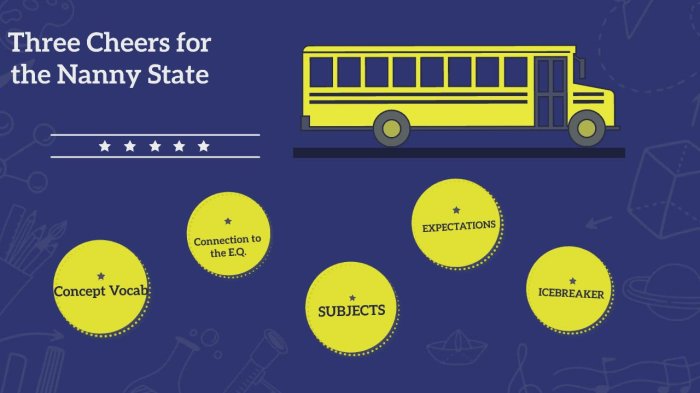Summary of three cheers for the nanny state – Cass Sunstein’s “Three Cheers for the Nanny State” presents a compelling case for paternalism, arguing that it can protect individuals from irrational choices and promote social welfare. This summary delves into Sunstein’s arguments, examining the ethical implications and ongoing debate surrounding paternalism.
Sunstein advocates for “libertarian paternalism,” which seeks to balance paternalism with individual autonomy. By nudging individuals toward better choices without infringing on their freedom, paternalism can enhance well-being while respecting personal liberty.
Introduction
Cass Sunstein’s book “Three Cheers for the Nanny State” argues that paternalism, or government intervention to protect individuals from their own harmful choices, is sometimes justified. Sunstein contends that paternalism can promote social welfare and protect individuals from irrational decisions.
Arguments in Favor of Paternalism

Sunstein presents several arguments in favor of paternalism. First, he argues that paternalism can protect individuals from their own irrational choices. He gives the example of mandatory seat belt laws, which have been shown to reduce traffic fatalities. Second, Sunstein argues that paternalism can promote social welfare.
He argues that paternalistic policies can help to reduce poverty, improve health, and increase educational attainment.
Arguments Against Paternalism

There are also a number of arguments against paternalism. One concern is that paternalism can infringe on individual autonomy. Critics argue that individuals should be free to make their own choices, even if those choices are harmful. Another concern is that paternalism can lead to government overreach.
Critics argue that paternalistic policies can be used to justify a wide range of government interventions, even those that are not necessary to protect individuals from harm.
Balancing Paternalism and Individual Autonomy

Sunstein proposes a balanced approach to paternalism that he calls “libertarian paternalism.” Libertarian paternalism seeks to protect individual autonomy while also promoting social welfare. Sunstein argues that libertarian paternalistic policies should be designed to be minimally intrusive and should only be used when there is a clear need to protect individuals from harm.
Ethical Implications of Paternalism: Summary Of Three Cheers For The Nanny State

The ethical implications of paternalism are complex. On the one hand, paternalism can be seen as a violation of individual rights. On the other hand, paternalism can be seen as a necessary evil to protect individuals from harm. Sunstein argues that the ethical justification for paternalism depends on the specific policy in question.
He argues that paternalistic policies should only be used when they are necessary to protect individuals from harm and when they are designed to be minimally intrusive.
Top FAQs
What is the main argument of “Three Cheers for the Nanny State”?
Sunstein argues that paternalism can protect individuals from irrational choices and promote social welfare, while balancing it with individual autonomy.
What is libertarian paternalism?
Libertarian paternalism is an approach that seeks to nudge individuals toward better choices without infringing on their freedom.
What are the ethical implications of paternalism?
Paternalism raises concerns about individual rights and collective well-being, requiring careful consideration of transparency, accountability, and public discourse.